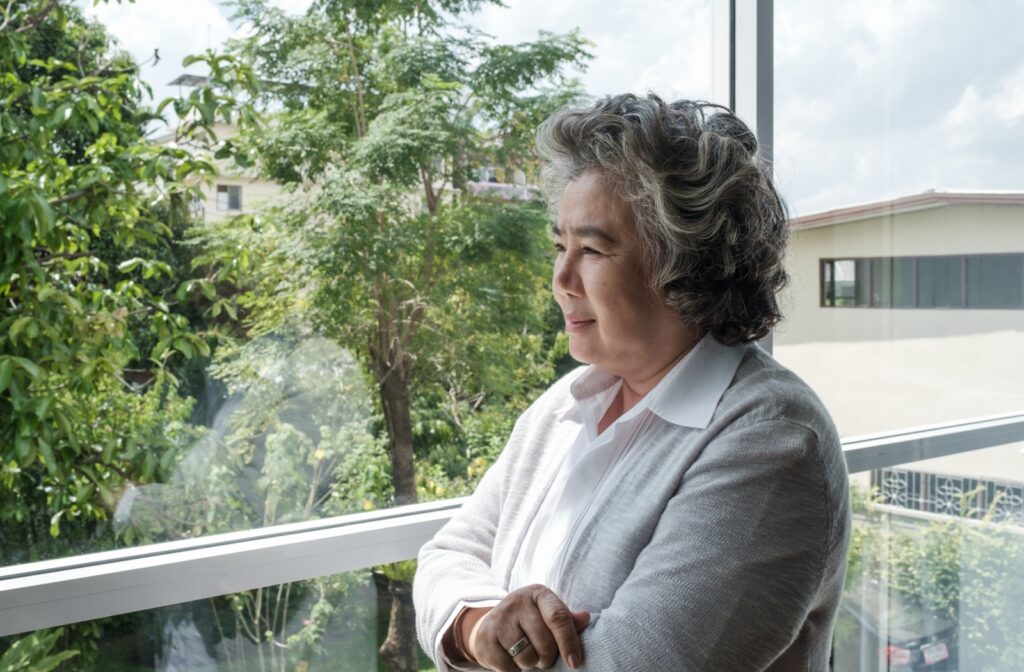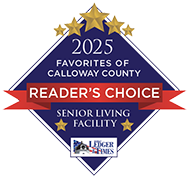Deciding when to transition a loved one to memory care is not easy. Every individual experiencing cognitive decline follows a unique path, and what works for one person may not be right for another.
For families, this decision often comes with a mix of emotions, from concern to love and even guilt. The right time to consider memory care depends on your loved one’s symptoms, quality of life, and safety.
Some signs that indicate that it’s time to consider a memory care community include:
- Declining cognitive & physical health
- Social withdrawal & isolation from their community
- You’re increasingly concerned for your loved one’s safety
- You’re experiencing caregiver burnout
What Is Memory Care?
Memory care is a specialized form of care designed to support individuals with Alzheimer’s, dementia, Parkinson’s, and other forms of cognitive decline.
The focus is on meeting their physical needs while providing a nurturing, structured environment tailored to their unique challenges.
Memory care can offer:
- A safe environment with thoughtfully designed spaces to reduce risks such as wandering & injuries
- Staff trained in memory conditions to provide personalized attention & 24/7 support
- Cognitive stimulation with activities, therapies, & programs designed to help maintain & enhance cognitive function
- Social connection with community environments to help residents feel supported through group activities
- Peace of mind for families, so you can focus on spending quality time together instead of managing daily caregiving duties
Signs It Might Be Time for Memory Care
Recognizing when to transition a loved one to memory care can be challenging. Here are some common signs that could suggest it’s time to consider this level of care.
1. Declining Physical & Cognitive Health
Cognitive decline often comes with physical symptoms and difficulties managing daily life. Pay attention to some of these indicators:
- Unexplained weight changes or unkempt appearance
- Issues with balance or frequent falls
- Chronic fatigue, muscle stiffness, or reduced mobility
- Increased forgetfulness, memory lapses, or confusion
- Behavioral or mood changes, such as irritability or fearfulness
When these symptoms begin affecting their ability to live safely and independently, a memory care program can provide the necessary support, offering professional care tailored to their needs.
2. Social Needs Are Unmet
Social isolation is common for aging adults experiencing cognitive decline. Isolation can lead to loneliness, frustration, and health issues—emotional and physical. They may find it difficult to:
- Follow conversations or communicate effectively with others
- Stay engaged in community or social activities
- Maintain relationships with family & friends
Memory care provides opportunities for residents to participate in group activities, fostering social bonds and engagement in a way that feels comfortable for each individual.
3. Safety Concerns
Safety is a pressing concern for many families. Cognitive decline can lead to:
- Missed medications or incorrect dosages
- Forgetting to turn off appliances, creating fire hazards
- Increased risk of wandering & getting lost
- Difficulty maintaining personal hygiene
These issues could result in dangerous situations if left unaddressed.
Memory care communities are designed with safety in mind, featuring open floor plans, mobility supports, and medication management to protect your loved one’s well-being.
4. Caregiver Burnout
Caring for a loved one with memory loss is a rewarding act of love. But it can also be emotionally and physically demanding. Burnout can reduce your ability to provide the quality care your loved one deserves.
Signs of caregiver burnout include:
- Increased stress or exhaustion
- Difficulty managing other personal responsibilities
- Feeling overwhelmed or helpless
Memory care can ease this burden, allowing professional caregivers to take over daily responsibilities. With their needs met, you can focus on quality moments with your loved one.
Determining the Right Time for Memory Care

There is no universal “right time” for memory care. Every individual and family dynamic is different. Conditions that affect cognitive function, such as dementia, Alzheimer’s, and Parkinson’s disease, are progressive. Your loved one’s needs will evolve over time.
Early in the condition, they might manage a degree of independence, but as symptoms worsen, the balance will shift. If daily life becomes unsafe or unmanageable for them—or increasingly overwhelming for you—it’s worth considering memory care.
Ultimately, the decision should prioritize your loved one’s safety, dignity, and quality of life. Transitioning to memory care can provide them with the compassionate support they need. You can enjoy peace of mind knowing they are cared for in a safe and nurturing environment.
Taking the Next Step Towards Memory Care
Our memory care community, The Gardens at Hickory Woods, is designed to provide life-enriching care and a sense of belonging for residents while easing the challenges for their loved ones.
From personalized care plans to a safe and welcoming environment, Hickory Woods Senior Living Community offers a home where your loved one can thrive.
If you want to see how memory care can make a difference, schedule a tour of our community today. Together, we can help your loved one live their best life, surrounded by care and compassion.


